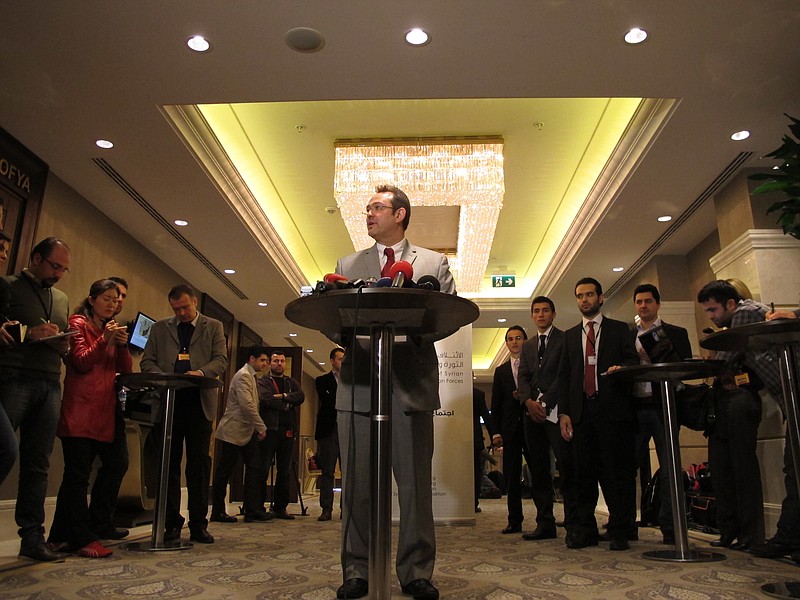ISTANBUL (AP) - Ending Syria's civil war through negotiations seemed an even more remote prospect Monday, as the main opposition group tried to set up a rival government to President Bashar Assad's regime and the U.S. said it won't stop allies from arming the rebels.
The opposition Syrian National Coalition met in Istanbul, Turkey, on Monday to elect a prime minister who would run an interim government in Syria's rebel-held areas.
The election was initially set for Tuesday, but officials then said it might take place later Monday. Similar efforts had been derailed by internal disputes in the past.
Setting up such a government, in a direct challenge to the regime, could harden battle lines even more and close the door to negotiations between Assad and the opposition.
The U.S. has been cool to the idea of a rival government, saying the focus should be on a political transition. Under a plan endorsed by the international community last year, Assad's supporters and opponents were to propose representatives for a transition government, with each side able to veto candidates.
However, the plan did not address Assad's role. Most in the Syrian opposition rule out any negotiations with the Syrian ruler.
On Monday, U.S. Secretary of State John Kerry said the Obama administration wants to leave the door open for a political solution.
But concerning Syria's rebels, "the United States does not stand in the way of other countries that made a decision to provide arms, whether it's France or Britain or others," Kerry said, speaking in Washington.
His comments came after French President Francois Hollande said last week that his country and Britain were pushing the European Union to lift its arms embargo on Syria as soon as possible so that they can send weapons to rebel fighters.
The two countries are seeking military help for the rebels by the end of May or earlier if possible. Germany and other EU nations have been skeptical, pointing to the risk of further escalation.
Britain and France argue that Assad will not hold genuine negotiations if he believes he can survive militarily and that strengthening the rebels is the only way of squeezing the regime.
Kerry's remarks indicate that the Obama administration will not interfere with any country seeking to rebalance the fight against an Assad regime supported by Russia, Iran and Hezbollah.
The United States long argued that more weapons in Syria would only make peace harder. As the violence has worsened over the last year, Washington has tempered that message somewhat. It is now promising nonlethal aid to the anti-Assad militias in the form of meals and medical kits, and refusing to rule out further escalation.
The Syria conflict erupted in March 2011 as a largely peaceful uprising. In response to a regime crackdown, the rebellion turned into an armed insurgency and then civil war. More than 70,000 people have been killed and some 4 million of Syria's 22 million people have been driven from their homes by the fighting, according to U.N. estimates.
The conflict remains deadlocked, with rebels controlling large areas in northern and eastern Syria, and the regime defending its hold on the capital Damascus and elsewhere. Services have broken down in many rebel-held areas, which come under frequent regime attack by air-dropped bombs and artillery.
The Syrian National Coalition, largely based in exile, has wrestled for weeks with a decision on setting up an interim government. The exiles could have trouble asserting their authority in war-ravaged regions, and the risk of failure is high.
"Expectations will be high and means will be low," said coalition member Louay Safi.
However, Safi believes support for an interim government will grow if it shows it can deliver services to people in the rebel-run territories. "Anyone who tries to oppose it will be in a difficult position," he said.
All those attending the Istanbul conference said they oppose negotiations between the opposition and the Assad regime on the terms of ending the war.
"We've heard a lot about this "peaceful solution,' but there are no positive, real steps from the regime, and the opposition presented its plan and it is clear that the regime was just playing for time," said Nizar Al Hrakey, another coalition member.
The election of a prime minister was initially to begin Tuesday, but conference participants said it might take place later Monday.
The coalition's 73-member general assembly is choosing among 12 candidates for the job.
Earlier Monday, the head of the main rebel group, the Free Syrian Army, lent his support to the idea of an interim government.
Gen. Salim Idris told reporters that fighters affiliated with the FSA will recognize the authority of such a government.
"We consider it the only legal government in the country," Idris said in Istanbul.
Idris also portrayed the FSA as the most powerful and organized rebel formation in Syria. It remains unclear, however, how many of the hundreds of rebel brigades fighting Assad's forces follow Idris' commands or are linked to his group.
Some of the most effective rebel groups are Islamic extremists who have developed their own support networks. One of them, Jabhat al-Nusra, has been designated a terrorist group by the United States and is said to be linked to al-Qaida.
Idris said his group has no relationship with Jabhat al-Nusra.
He renewed his call for world powers to arm rebel fighters, saying his group would ensure that the weapons don't fall into the wrong hands - a prime concern of the U.S. and other powers, especially given Syria's southern frontier with Israel.
"We have the power and the organizational capacity to control the movement of these weapons and keep them in safe, trusted hands," he said.

